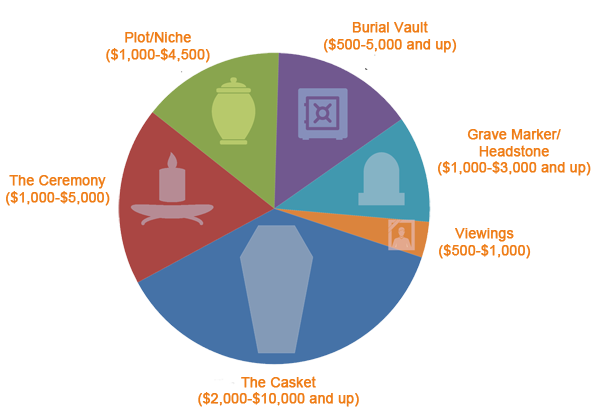Find out How Much a Funeral Costs
See Average Funeral Costs in the U.S. What’s Included in Average Funeral Costs?
What’s Included in Average Funeral Costs?
Estimating the cost of a funeral can be tricky. Average funeral costs continue to rise, and many elements must be considered. For example, even a simple funeral ceremony will include services, a casket, a vault, embalming, a grave site, and more. To make matters worse, funeral service providers and cemeteries expect payment in full at the time of the funeral. It’s little wonder that shopping for a funeral can be overwhelming.
How Much a Funeral Costs
Funeral costs vary widely depending on where you live and what components you want to include in the funeral ceremony.
Based on our research and industry studies, average funeral costs are:
- Cremation with a traditional funeral service (the casket is present, and you have a visitation) is $7,000-$9,500.
- Cremation with a memorial service (takes place sometime after the cremation, the casket is not present, and does not include a visitation) is $4,000-$6,000.
- No funeral or memorial service (cremation) is $750-$4,500.
- Burial with a traditional funeral service (visitation and the casket is present) is $12,500-$17,500.
- Burial with a memorial service (no casket, no visitation) costs $11,500-$ 15,500.
Average Cost of a Funeral: Breakdown
According to the latest Funeral Price Survey by the National Funeral Directors Association, the average funeral cost in 2019 was $9,135. However, this includes only the most commonly selected items for a traditional funeral, such as a casket and vault. It does not include the cost of the cemetery. When considering the average funeral cost, $11,000 or more is probably closer to what a typical traditional funeral costs. A private cemetery burial plot is likely to cost at least $2,000.
>>Learn About the Cost of Cremation
Funeral Costs: The big-ticket items.
Knowing precisely what the cost of a funeral includes will help you get a clear picture. Especially when you remember that it is the big-ticket items that truly drive the cost.
A quality casket can cost as little as $2,000 or more than $10,000. Your specific choices can cause the cost of the funeral to go up or down significantly. Here are some things to keep in mind:
- Traditional burial can cost significantly more than cremation. This is a key reason that the use of cremation is on the rise.
- The exact cost of a funeral will depend on the quality of the casket, burial vault, and other merchandise selected.
- You can arrange a direct burial (no service) or cremation for under $1,000, excluding cemetery costs. The exact price will depend on your location.
- We recommend that you consider holding a memorial service of some kind to acknowledge the passing of your loved one, even if the service is a simple one.
- Preplanning is the best way to manage funeral costs. See our Top 5 Reasons to Preplan a Funeral.
Major Funeral Expense Elements
The pie chart below highlights the key elements that go into the cost of a traditional funeral. Consequently, these are the areas that you should focus on when trying to understand the cost of the funeral you have in mind.

- Plot/Niche ($1,000-4,500): Costs vary by the cemetery and the location of the space within a cemetery. Carefully consider your options. (More on Cemeteries.)
- Burial Vault ($500-$5,000): Vaults do not prevent decay. A grave liner or simple concrete vault may be sufficient and is usually less expensive. (More on Burial Vaults.)
- Grave Marker/Headstone ($1,000-$3,000 and up): A simple stone can be less than $1,000. You can buy from the cemetery or a monument dealer. (More on Grave Markers.)
- The Casket ($2,000-$10,000 and up): You can buy from your funeral home or a casket dealer in person or online. For a traditional funeral followed by cremation, rent a casket. (More on Caskets.)
- Viewings ($500-$1,000): Each viewing session you have adds to the cost. The most economical option is to have one viewing on the same day as the funeral.
- The Ceremony ($1,000-$5,000): Each element of the funeral or memorial service will add to the cost. In other words, decide what is most important to you and skip the rest. (More on Ceremonies.)
8 Tips For Managing Funeral Costs
- Plan in Advance
The best way to avoid spending more than you need is by preplanning your funeral. Planning ahead gives you time to review your options without the pressure of a time constraint. You’ll also have the luxury of avoiding the risk of making unnecessary emotional purchases. Learn more about our After Me Planner and Organizer for funeral preplanning.
- Set A Budget
It always helps to know what you can afford to spend before you start shopping. Think of planning your funeral the same way you would think about planning a celebration for any big life event. If you think about it, planning a funeral is a lot like planning a wedding. You wouldn’t plan a wedding without knowing how much you want to spend! Allocate most of your funeral dollars to the elements that have the most meaning to you.
- Know What You Want
Even if you are making arrangements for a death that has already happened, it is best to take a little time to think about what type of funeral you want before you meet with the funeral director. That way, you can help avoid making purchases you don’t want or need. Our online planning tools can help you think about the items you need to consider. Above all, you’ll be better prepared to answer the questions that the funeral director will ask you. (More on meeting with the Funeral Director and on making funeral arrangements.)
- Shop Around
Whether it’s doing research online or stopping into local funeral homes, you can learn a lot by shopping around. In fact, you’ll probably be surprised by the wide variety of choices that are available at very affordable prices. Visit our Find Services page to search for funeral providers in your area.
- Look Hard At The Most Expensive Items
Your most significant cost savings can come from the big-ticket items. These items (caskets, grave markers, and urns) come in a wide range of prices. Many beautiful options are reasonably priced, therefore, it is not always necessary to buy the most expensive style.
- Ask For Help
It can help to bring a trusted friend or family member with you when you shop. Your companion can speak on your behalf if difficult negotiations are involved. The decisions to be made are extremely personal and emotional. Keep in mind, you may be grieving and not in the best frame of mind to make significant financial decisions. The person should be someone you trust and who has a personality that you think will be calming for you.
- Consider Prefunding
If you pay for funeral costs in advance, you may be able to lock in today’s prices with a guaranteed funeral contract. But like any big financial purchase, you should do your homework. You want to make sure that the plan you select is right for you. Be sure to read all of the fine print!
- Know Your Rights
The FTC’s “Funeral Rule” requires that you be provided with prices in writing and over the phone. As a buyer, knowing the basics of the Rule can help you avoid sales traps. If you feel you are being treated unfairly, contact your state Attorney General’s office or the local funeral home regulatory board.
Paying for Funeral Costs
There are many ways to pay for a funeral, and new options, such as crowdfunding, are now popular. These are excellent tools for emergency situations. But, even with latest tools, the best way to ensure you get the funeral you want is to turn to traditional methods such as:
Funeral Insurance:
Buying funeral insurance to cover your funeral costs can be a smart money move. However, before you buy, you’ll need to do some research. Luckily, we’ve done a lot of the homework for you. Visit our Funeral Insurance pages for information on what to look for in a funeral insurance policy and tips on buying the best policy for your unique situation.
Preneed Funeral Contracts:
To arrange a preneed contract, you work with a funeral service provider, a cemetery, or both. Working together, you decide what to include in the contract and how to pay for it. You may contract for cemetery property and services, funeral services, or both. So it is critical to remember that when it comes to preneed contracts, you should be very sure of what you are buying and the contract terms. For more information, check out our article on Preneed Funeral Contracts.
Pre-Paying Funeral Costs:
You make specific selections when entering a preneed contract with a funeral home or cemetery. That is to say, you are paying for the funeral in advance. The key benefit to pre-payment is that you lock in today’s prices. As mentioned above, our Wise Protection Plan is a great way to create a prepaid funeral plan. Plus, it has many extra benefits you won’t find anywhere else.
Direct Savings:
Many people find it simple to set money aside in a conventional account, such as a savings or money market account. However, this approach has the risk of making it difficult to guarantee that the money is used for the proper purpose. Your survivors will need immediate access to these funds following your death. Be sure to talk to your bank or financial advisor to ensure the account is set up so that a person you trust can withdraw the funds.
Funeral Trusts:
A funeral trust is similar to a regular savings account. However, these funds are legally designated for funeral expenses. Any money that remains after the funeral can be distributed to your estate. Remember that regulations regarding funeral trusts vary from state to state. As a result, you should consult with your attorney or banker to ensure the trust is set up correctly. Many funeral providers can help you set up a Funeral Trust. See our article on Funeral Trusts for more information.
Public Assistance:
Federal, state, and local programs can help defray the cost of funeral expenses. For example, Social Security, provides a one-time death benefit of $255. The Veterans Administration also provides funeral benefits to eligible individuals. Many counties have programs to help people with limited resources cover funeral expenses. For more information on ways to claim public assistance, visit our Paying for a Funeral page.

